
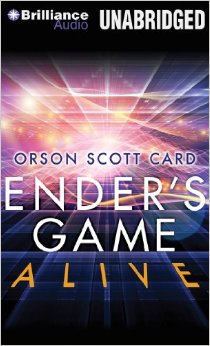
Ender’s Game Alive
By Orson Scott Card; Performed by a full cast
Publisher: Skyboat Media
Published: 2013
7 hours 24 minutes [UNABRIDGED]
Themes: / science fiction / childhood / aliens
Sometimes you hear about something and can’t wait to get your hands on it because you want to experience it, to touch it, see it, whatever. You have expectations and hope like mad that in the end, you won’t be disappointed.
for me, the new audio drama adaptation of Orson Scott Card’s novel Ender’s Game fits the above description perfectly. The fact that Card wrote the script himself only made the anticipation worse because the bar went higher. It was raised further when I found out who was producing it: the folks at Skyboat Media. To find out whether or not they succeeded, the end result, (enemy’s gate), is down.
An important note for Ender’s Game fans, I am going to be limiting my scope to the book when reviewing this audio play. For the purposes of this review, the film does not exist. I want to tackle that challenge under its own merits. Any references to it will be made in passing if at all. With that said, our gate is open; on with the review.
The setup: a young boy at the age of six is taken from his home to attend a school for brilliant minds; to turn the “little dorklings” into soldiers and commanders because there is a war going on. This is the third such conflict with this alien race and our protagonist (unknown to him at the onset), is being groomed to be the commander that leads the entire fleet, hopefully, with good results. If not, the human race is doomed.
Our story follows Andrew Wiggin (nicknamed “Ender” by his sister) from the very beginning of his journey; even before that when the decision is made by his parents to have him with the full knowledge that this goes against the population policy in place.
“No more thirds.”
Of course, because this is the international fleet (I.F.) making the request; the rules are bent. All they have to do is sign on the dotted line and fill out the forms. If they don’t, genetic material will be seized and used until the right child is born and sent to battle school; a space station that prepares its students for lives spent as part of the fleet.
Ender’s parents are a special case because their first two children , Peter and Valentine, are geniuses. Why the first wasn’t chosen for the school, (as explained by the commander in charge), is because the kid is plum psycho. Why the sister isn’t picked is because she’d break under actual battle pressure when real losses come her way. And thus the fleet wants the parents to give it another go or else. This is the world Ender is born in. He’s at a disadvantage from the start. The running theme is, “Let’s see how ender handles it.”
The audio play does a great job of setting the appropriate pieces on the chessboard and letting the game play out. The story to tell is Ender’s story. Where it deviates from the book is the fleshing out of the interactions between the staff observing his progress. This is a necessary change since the book mostly takes place from Ender’s mind and point of view. This may seem like The Cabin in the Woods kind of gimmick but it is an important evolution in the way the story is being told. The play has to present things from a different angle and come to the same conclusions; adjusting things as needed to fit the plot’s progression.
the second major deviation is the focus on the other Wiggin children subplot. There are hints to it but it is treated almost as an afterthought. The reasoning for this change is sound; political debates and research would only drag down the story and make the listening experience tedious in places.
All in all, the major plot points of the novel are hit home like a well-aimed shot. There are subtle clues to other works that have been written since Ender’s Game came out in 1985. There are adjustments to some scenes to give the audio play a different feel than just a retreading of the original story step for step. This gives us something a little unexpected and fresh as we take the 7 hour, 24 minute journey.
If you have listened to the audio book of Ender’s Game, several of the casting choices will be no surprise. You hear a particular person’s voice and feel a sense of familiarity that makes the experience that much more enjoyable. Each character is brought to life. You know them, understand them, will not always agree with them or the decisions they make, but can listen to these portrayals and feel like you are the proverbial fly on the wall throughout the story. And when you listen to a scene as heart-felt as when Ender breaks down before his next assignment to command school, you really connect with the emotions in the room. This is how good storytelling becomes great by simply allowing the actors to raise the bar by their performances. The scenes before build up to a moment that is devastating in its impact.
The sound design and score never distract from the dialogue. And for the most part, the editing of the words spoken is top notch. Occasionally, you will hear the hum of the studio where lines were being recorded. If this issue were a constant refrain, I wouldn’t have enjoyed the play as much. As it stands, I only noticed such things myself when listening to the play a second time. That just shows you how engaging the whole packages when listening to it. Even though I noticed these issues, I wasn’t distracted.
At the end of the original audio book, Orson Scott Card said that it was the definitive way to experience his novel. With Ender’s Game Alive, that statement may (and should) be revised. It is a masterful work of audio fiction. Of course, this is in part to the source material. But the transformation from novel to audio play is not an easy undertaking. Orson Scott Card’s background in theatre shines through in this presentation; letting the dialogue drive the story forward. The many actors take on the roles and bring them to life. You won’t mind when adults are playing children. You just want to hear where the story goes. Aside for the minor audio issues, (studio hum in a couple scenes which I won’t spoil here and the inconsistent panning of characters when talking to each other), the production is definitely a recommended listen if you are a fan of Ender’s Game. I give it five out of five toon leaders; that’s one victory ritual.
Posted by Allen Sale

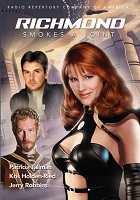 A new release from Angelo Panetta and the good folks at the Radio Repertory Company of America!
A new release from Angelo Panetta and the good folks at the Radio Repertory Company of America!




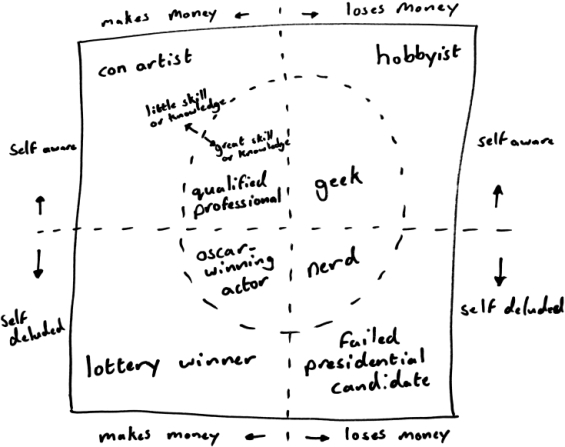
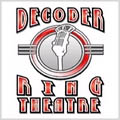
 The SFFaudio Podcast #189 – Jesse, Tamahome, Jenny, and
The SFFaudio Podcast #189 – Jesse, Tamahome, Jenny, and 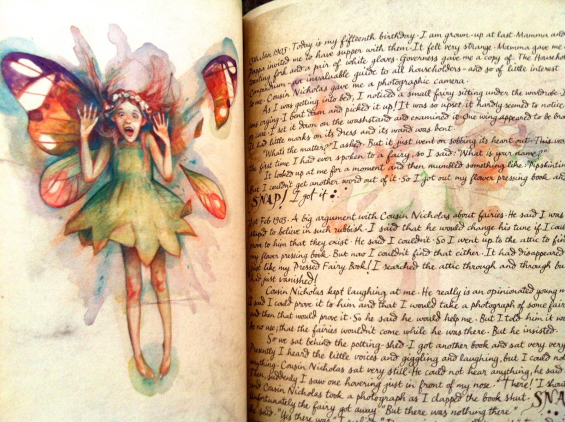
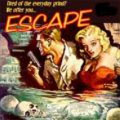
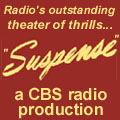 The SFFaudio Podcast #185 – Jesse, Tamahome, and Christine A. Miller (of
The SFFaudio Podcast #185 – Jesse, Tamahome, and Christine A. Miller (of